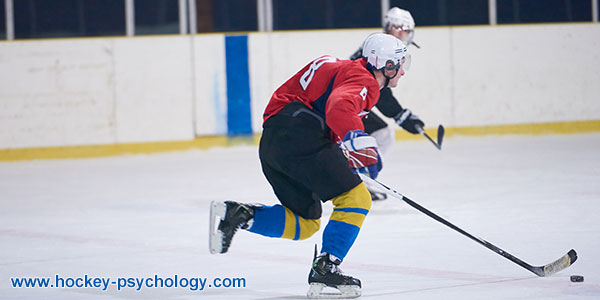How to Let Go of Strict Expectations in Hockey
Peak performance shows up in your work ethic on the ice and not always on the stat sheet.
Sometimes, hockey players become consumed by their numbers…
- “How many goals did I score?”
- “How many assists did I have?”
- “How many saves did I make?”
The numbers game is a game of high expectations, for example, “I need to make two assists every game.”
This game day expectation puts the focus on the outcome and statistics rather than just playing the game one play at a time.
High expectations cause players to feel more pressure, judge their performance harshly, and quickly lose confidence when they don’t play up to their expectations.
Let’s see how high expectations create problems for a hockey player…
When a player internally states, “I need to make two assists,” it becomes a conditional statement, “If I don’t make two assists, then…”
There are many different outcomes that players get distracted by, “If I don’t make two assists, then I’m no good,” “If I don’t make two assists, I won’t play on the top line,” or, “If I don’t make two assists, I will not get a college scholarship.”
All high expectations put undue pressure on the player to achieve them.
Another problem with placing high demands on your play is that there are many things that are outside of your control that can minimize or even eliminate your chances to add tally marks on the stat sheet, such as:
- Reduced playing time
- The performance level by the opposing team
- Unlucky bounces
- Great saves by the other team’s goaltender
- Your team under performing
- Teammates that are missing from action for a particular game
There will be many games when shots just don’t go in or the puck doesn’t bounce your way. The “numbers” don’t always tell the full story of your performance.
You can impact the game in a number of ways that don’t appear on the stat sheet, such as:
- Winning loose pucks
- Poke checks at center ice
- Making a defensive stop
- Clearing the puck out of your zone
- Making a good outlet pass, etc.
When it comes to having an impact on the game, it is better to focus on playing hard and doing the little things right.
Philadelphia Flyers rookie, Oskar Lindblom, has played great hockey despite not showing up on the score sheet.
Despite not scoring, Lindblom is positively impacting games for the Flyers by fore checking, creating turnovers, playing aggressively, winning loose pucks and pushing the puck forward.
LINDBLOM: “I’m getting chances. I just have to keep going here. Not trying to be too negative. I feel like I am playing good.”
Lindblom knows that, if he keeps doing the little things, he will contribute to the success of the team and, eventually, the goals will come.
There are always ways to impact the score sheet without putting the puck in the net, so drop the high demands you place on yourself and play smart hockey.
How to Free Yourself From Strict Expectations:
- Identify three high expectations that you have for a game.
- Commit to letting go of outcome expectations and focusing on one play a a time
- Look for little ways to impact the game.
Commit to being aggressive and playing smart hockey.
Hustle plays are directly within your control and there are far more opportunities to make hustle plays than there will be scoring chances.
Related Articles on Hockey Mental Game:
- When Pushing Athletes to Excel Turns into Pressure
- Mental Keys to Recovery for Hockey Players
- Your Mindset and Finishing Hockey Games
*Subscribe to The Sports Psychology Podcast on iTunes
*Subscribe to The Sports Psychology Podcast on Spotify
Mental Coaching Programs for Hockey
Our mental game coaching programs for hockey players helps athletes improve confidence, concentration, let go of errors quickly, and stay composed during crunch-time. Read more about sports psychology for hockey players at Peaksports.com
Please contact me by phone at 888-742-7225 or by filling out the webform below to learn more about our personal mental training programs for hockey players or teams:

Leave a Reply